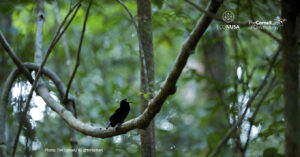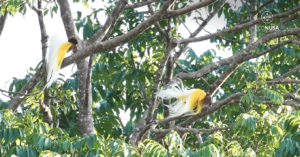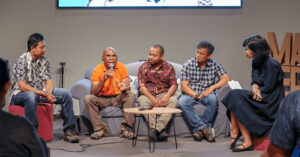
Various efforts to protect primary forests in Indonesia are actually deemed collective endeavour to save human from many ecological problems so as not to vanish. Forests sustainability is one of the important factors to slow down until halt the nerve-racking global warming.
CEO of EcoNusa Foundation Bustar Maitar said that forest logging or deforestation has contributed 30 percent of greenhouse gas emission globally. If deforestation is uncontrollable, climate change arising from global warming will affect every aspect of people’s life.
“Fishermen used to know precisely whether or not they should go to the sea. Now, it is uncertain. Some friends living in Jakarta might see how Jakarta coastal lines have been scraped by abrasion due to the rising sea level. So, it is not only about forest story, but how we can survive,” said Bustar in a virtual discussion entitled “Tanah Papua: Last Frontier of World’s Tropical Forest” on Friday 21 August 2020.
Bustar said that Tanah Papua is deemed the last frontier of tropical rainforests in Indonesia. Forests in Sumatera, Kalimantan and Sulawesi have been degraded due to forest and land use change for plantation and mining.
Besides, tropical rainforest in Tanah Papua is the place with the highest flora diversity in the world. Nature journal publication mentioned that there are more than 13,000 flora species in which 9,000 of them is endemic. The figure has shifted Madagascar with its 11,488 species from the top level.
It is not only about flora, Tanah Papua also has multifarious fauna. There are 716 types of birds, 125 mammalian, and 223 reptiles. The figures will be growing up along with new studies in the future.
Unfortunately, Tanah Papua has always put up with prolonging threat. From 1990 to 2019, forests size in Tanah Papua dropped by nearly 2 million hectares as from 33 million hectares. It is indubitable fact that the land of Cenderawasih is one of the most wanted forests when other forests across Indonesia have been vanished recently.
Degraded forests in Papua have impacted to the Papuan peoples, particularly the indigenous people whose livelihood depends on forests resources. The indigenous community here considers forests as if their mother nature that provides sustenance to her children. The traditional system here is utilized for forest management to suffice their livelihood. When forests are destroyed, the indigenous people will lose their resources for food and culture with which they have been living from generation to generation.
Protecting forests and ecology are deemed everyone’s duty. Protection does not limit to Papuan forests but also the remaining forests across Indonesia. Not simply people living surrounding the forests but also all communities including academicians are obliged to protect ecological aspects here.
Plant Taxonomy Biology of Jakarta State University’s School of Sciences lecturer, Agung Sedayu, said that natural resources protection has actually been recognized by public. In Majapahit era, Archipelago people had enacted Act of Katiden (Piagam Katiden) stipulating animal protection.
“Animal should be protected, unless the animal rushes into a village and eat food vegetation. In Piagam Katiden II, it mandates free tax to Katiden people for protecting meadows at Mount Lejar,” said Agung.
Following the independence of Indonesia, academic society can play their roles in nature conservation by producing data from field before taking real action, educating and disseminating research findings to public.
As to Agung, students have unique position amidst the society. In the one hand, students have capacity to boost internal capacity through observation and research. On the other hand, students could improve the community knowledge and competence by dissemination of their studies.
“Academician plays its role as scientist and pragmatist. These functions are more mobile than serious researcher at research center as well as NGO activists. Students do not have any resistance in a region,” said Agung in a virtual event attended by 386 participants.
Editor: Leo Wahyud & Lutfy Putra




